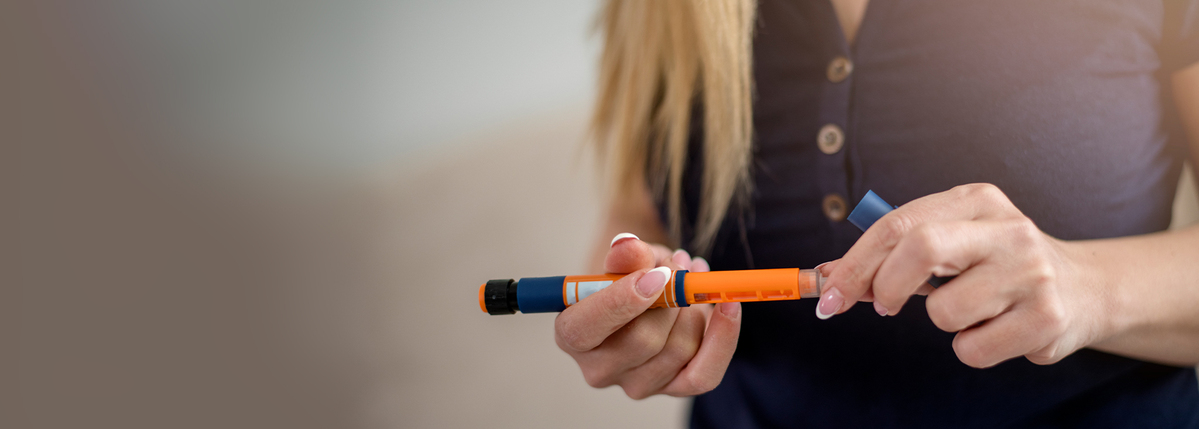“My doctor refused to put me on insulin for Type 2 diabetes, so I got a new doctor.”
Editor’s Note: Type 2 diabetes is a complex disease. Some people will need the support of daily insulin therapy or other types of diabetes medications. Others may find changes in diet and exercise are enough to improve blood sugar levels. Please talk to your doctor before making any changes in your diabetes regimen if you live with type 1 or type 2 diabetes.
Before Kate Cornell was diagnosed with type 2 diabetes in 2005 at 50 years old, she had no idea anything was wrong.
“I was diagnosed by a routine blood test at my gynecologist’s office,” she recalls. “They didn’t check my A1c, just my blood sugar, and after seeing the results, they told me, ‘I’m sorry, but you have diabetes.’”
Kate quickly scheduled a follow-up appointment with her primary care provider where she was told, “You probably have type 2. Just change what you’re eating and get some exercise. And start checking your blood sugar with a blood glucose meter.”
Without receiving any diabetes education or take-home materials, Kate set-off on her own to improve her blood sugar levels.
“It was super frustrating, because I didn’t know what to eat. I tried so many things, including WeightWatchers, but nothing worked,” she recalls.
Finally, metformin.
At least two years after her diagnosis, Kate’s doctor finally prescribed metformin.
Starting on a very low dose to prevent the most common side effects, Kate’s metformin dose increased gradually over the course of two years, to a daily dose of 2,000 mg per day.
Meanwhile, she’d made a lot of changes in her diet in an effort to further tame her blood sugars. More specifically, she cut out a lot of carbs, which also led to her realization that she struggles with food addiction.
“I also tried eating really, really low-carb for a summer, and it did help my blood sugars,” explains Kate. “But I couldn’t sustain it, I felt miserable. But I also know I can’t just have a little bit of something because of my food addiction.”
Trying to eat even a thoughtful amount of carbs proved to be too much for her blood sugar to regulate itself without additional medication help.
While reducing your daily carbohydrate (which includes sugar) intake can be a very helpful approach to improving blood sugar levels, it doesn’t mean you should have to eat zero carbohydrates to stay in your goal blood sugar range.
Medications can help lower blood sugar levels in different ways. For example, some reduce the amount of sugar your liver produces throughout the day. Others can increase your body’s natural insulin production or make you more sensitive to insulin. There is no one-size-fits-all approach to managing type 2 diabetes and determining what kind of support your body needs can take time.
“Even a sandwich would cause a super spike in my blood sugar,” she recalls. “If you can’t eat a sandwich without a spike in your blood sugar, you need a different medication.”
Begging for insulin.
With her fasting blood sugar levels in the 150 to 160 mg/dL range, Kate felt she should try insulin, but her doctor refused to prescribe it.
“I’d been asking to start insulin before this but they always said, ‘but your A1c is fine, you don’t need it.’ It was so frustrating because a fasting blood sugar of 150 mg/dL is not fine.”
A “fasting” blood sugar level is in the morning, before eating breakfast. A non-diabetic fasting blood sugar is generally below 100 mg/dL. Waking up around 150 mg/dL means Kate is significantly above a safe level throughout the night, even when it’s been hours since she last ate. This is a clear sign that her body may need more support to manage healthy blood sugar levels.
Kate ditched her provider for a new one who put her on a basal (long-acting) insulin immediately.
“I actually cried in his office when he agreed to write a prescription for insulin!” she recalls.
While the basal insulin has helped remarkably, she’s still frustrated, because several doctors have now told her she doesn’t need to be on insulin at all.
While her doctor is following outdated understandings of when, who and why a person with type 2 diabetes (T2D) might need insulin, Kate knows her body’s insulin production is not enough to keep her blood sugars in her goal range
For decades, there’s been a misunderstanding that people with T2D just need to lose weight, eat healthy and exercise daily in order to achieve normal blood sugar levels. Instead, further research has found that many people with T2D gradually produce less and less insulin overtime, calling for the support of other diabetes medications—including insulin.
Being told to eat more carbs…without mealtime insulin.
Frequently spiking to 250 mg/dL after meals, Kate has no real tool to get it down.
“They still won’t consider putting me on mealtime insulin, but I can’t eat normally because everything spikes my blood sugar,” says Kate. “I have a weird relationship with food because of it.”
Even carrots, a high-fiber and relatively low-carb vegetable, spike her blood sugar. Compared to a bowl of oats or corn, carrots are relatively low in carbohydrates. Kate has chosen to educate herself thoroughly on healthy eating and low-carb cooking and what impact it should be having on her blood sugar management, so it’s obvious to her that mealtime insulin would make a huge difference.
“I live in a small community and there’s not many doctors to go to. When I did go to a diabetes educator, she looked at what I was eating and all she did was encourage me to eat more carbs—like potatoes,” says Kate, which only added to her frustration.
“They scold me for not eating enough carbs but they won’t give me mealtime insulin to help me manage the impact of those carbs on my blood sugar.”
For now, Kate is pressing pause on the tiring fight to get mealtime insulin, but she’s grateful for the basal insulin in the meantime.
“I never ever had an issue mentally with the idea of taking insulin,” adds Kate, “because it’s obvious my body needs it.”
Here are some resources if you’re struggling with achieving your blood sugar goals and want to talk to your doctor about your medication options:
- Talking to your doctor about inhaled insulin
- Talking to your doctor about your diabetes medication options
- Do I need insulin?
Educational content related to Type 2 diabetes is made possible with support from Lilly Diabetes. Beyond Type 2 maintains full editorial control of all content published on our platforms.





